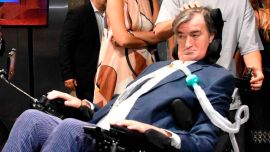Most people would identify an economic crisis gathering momentum for the second half of the year as their foremost worry but nothing can replace the judicial arena as the top priority for Vice-President Cristina Fernández de Kirchner as she renewed her onslaught against the Supreme Court at the start of the week, gaining assurance of presidential support the next day.
The veep has long accused the Supreme Court of presiding over a general “lawfare” political persecution of Kirchnerism by the judiciary but Monday’s video went further in also holding the justices responsible for the economic crisis of wider concern via rulings which hamstrung the government by making it “very difficult to improve Argentine living conditions.”
The attack comes with her trial for public works graft in the award of highway construction contracts due to start next month, a context which Cristina Kirchner did not dodge because she said that her conviction had “already been signed” even before the prosecutor had read out the charges (quoting herself as already anticipating this verdict back on December 1, 2019). This aspect was picked up by President Alberto Fernández as a central piece of his defence the following day – accepting as fact CFK’s claim that her sentence had already been written, he said that this alone placed “the moral authority (of the judiciary) in crisis.”
In rejecting the vice-presidential critique, the opposition also placed the attack in that context, attributing it to a bid to pressure the courts ahead of the trials, while Cristina Kirchner insisted that the Supreme Court carried the ultimate responsibility for these corruption trials going ahead by recently rejecting all her appeals.
Monday’s 14-minute video was entitled: “From the exemplary court to the court of four, a brief chronicle of decadence,” bisected into equal parts on the two courts.
The “exemplary court” was the work of her late husband Néstor Kirchner upon reaching presidential office in 2003 when he replaced the “automatic majority” of the 1989-99 Carlos Menem administration with independent justices delivering “memorable rulings,” the video maintained.
CFK dated the decline of the Supreme Court from 2015 (and not 2013 when the justices nixed her “democratisation of justice,” as she entitled a judicial reform aimed at placing the courts under greater electoral and political control). In that year the incoming president Mauricio Macri “in open and flagrant violation of the Constitution decreed Horacio Rosatti and Carlos Rosenkrantz as members of the Supreme Court, who in turn accepted being thus designated, violating the Constitution” (in point of fact Rosatti and Rosenkrantz delayed their acceptance until they received the constitutionally ordained Senate approval several months later).
“This episode was a turning-point heralding a process of political, judicial and media persecution the region with Brazil, Argentina and Ecuador as its very clear pivots,” the video claimed.
Backing up his veep the next day, President Fernández added self-appointment as head of the Magistrates Council to the reproaches against Rosatti. In his opinion, those rejecting the attack “chose to criticise its forms in order to dodge the real problem – that our judicial system has lost all legitimacy and urgently needs a profound and democratic reform,” concluding: “As President, I remain committed to we Argentines having a (system of) justice which is honest and independent of the powers that be.”
Alongside this presidential defence, Justice Minister Martín Soria was one of various Kirchnerite voices stating that slapping an electoral ban on the Vice-President was among the objectives of the corruption trials, an opinion also advanced by former Supreme Court justice Raúl Eugenio Zaffaroni (even if a court sentence did not bar Menem from his 2003 presidential run nor repeated senatorial runs).
But judges, prosecutors, court officials and their associations did not agree, faulting the video for “lacking balance and institutional respect” and insisting that “judicial independence is a human right.”
The Juntos por el Cambio opposition also chimed in with its lower house caucus chief Mario Negri (Radical-Córdoba) replying: “The Supreme Court is not the problem. Cristina Kirchner attacks it only because it rules against her. That’s why she wants a Supreme Court with 25 justices – she’s desperate for impunity. Having demolished the economy, she’s now going for the institutions.”
Even harsher was the Civic Coalition deputy Paula Oliveto: “What she does not explain in her video is how she made her multi-million fortune in liquid dollars or how her secretaries passed from being beggars to millionaires while her partner Lázaro (Báez) went from bank clerk to landowner. Argentina is going hungry and she only cares about her cases.”
– AFP/TIMES





















Comments